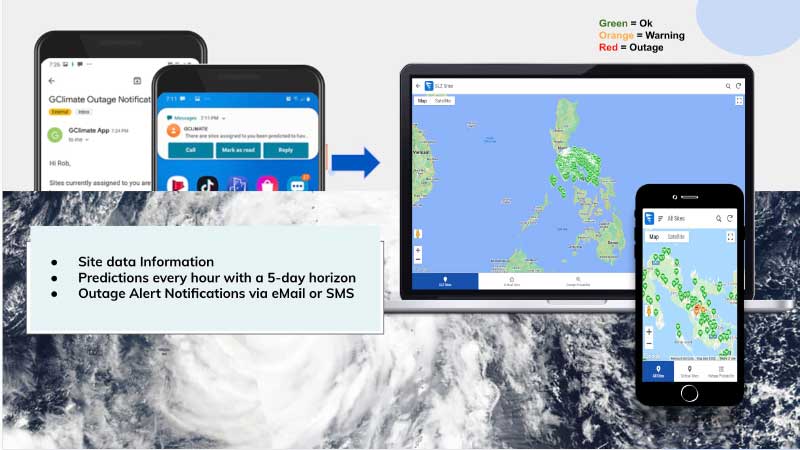Leading digital solutions platform Globe will deploy G-Climate, a digital service used to reduce the downtime of cell sites and ensure business continuity during times of disaster, especially typhoons.
Globe collaborated with Amazon Web Services (AWS) to develop G-Climate, a cloud native service, which uses predictive analytics on various data points such as weather information, weather patterns, and cell site outage data to identify potential outages specifically during the typhoon season.
G-Climate was developed to address the impact of severe weather disturbances, which roughly causes 10 to 20 percent of outages at Globe’s cell sites.
This innovation is in line with its commitment to the United Nations Sustainable Development Goals, particularly UN SDG No. 9, highlighting the roles of infrastructure and innovation as crucial drivers of economic growth and development.
“Since communications are vital during disasters, Globe is doing its best to minimize the impact of climate-related risks, particularly the downtime of cell sites in typhoon-prone areas. G-Climate is one of the ways to mitigate the effects of severe weather conditions beyond our control,” said Yoly Crisanto, Chief Sustainability and Corporate Communications Officer, Globe Group.
“It is great to see Globe create and use G-Climate App built using AWS Machine Learning services including Amazon SageMaker to drive faster operational decisions in critical situations and natural disasters like typhoons, floods, and earthquakes. More importantly, restoring communication facilities as fast as possible after a disaster strikes allows our citizens to reconnect and stay connected with families, friends, and loved ones and have access to their finances, funds, and other critical support services,” said Stephen Thomas Misa, Country Head of AWS Philippines.
To predict which cell sites may experience an outage, G-Climate uses historical and current weather data and site information. This allows Globe to optimize the location of engineers, supplies and backup power to prevent or reduce customer downtime.
G-Climate aims to improve restoration time by 30 percent to benefit subscribers impacted by typhoons. Other potential benefits include a reduction in revenue loss, infrastructure damage and restoration costs, and time spent submitting insurance claims.
Globe engineers will use G-Climate instead of compiling multiple types of information to get weather forecasts and daily updates. Engineers assigned to a particular area receive email notifications on outage predictions for the cell sites within their area, allowing them to take precautionary measures. G-Climate’s machine learning automatically analyzes multiple sources of information throughout the day including historic cell site information and updated weather information.
G-Climate will be integrated in the network operation’s ticketing system so that engineers are able to inspect a site prior to a typhoon’s landfall. Restoration efforts, however, may still be impacted by multiple fiber cuts, and road-clearing operations.
To ensure network resiliency and business continuity, Globe equips key sites with relevant access technologies and redundant transport facilities in the event of an area-wide outage, fortifies transport facilities, and complements backup environment-friendly batteries with higher capacity generator sets to address prolonged commercial power outages.
Globe also invested in rapid-deployment solutions for stop-gap approaches and quick fixes in areas that need immediate support in times of disasters. This includes Cell Site On Wheels (COW) and Tower on Wheels (TOW), which are retractable towers that can be deployed quickly to provide temporary coverage and capacity in areas affected by network outage.
Other solutions include the Cellsite-on-a-Light Truck (COLT), Genset-on-a-Truck (GOAT) mobile generators and Network-in-a-Box (NIB) portable cell sites, which can be set up in strategic locations to provide temporary coverage and capacity in these affected areas.
To learn more about Globe, visit https://www.globe.com.ph.























